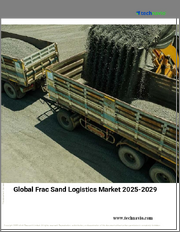
|
시장보고서
상품코드
1728397
프랙샌드 시장 : 세계 산업 규모, 점유율, 동향, 기회, 예측 - 제품별(화이트 샌드, 브라운 샌드), 용도별(석유 탐사, 천연가스 탐사), 지역별, 경쟁별(2020-2030년)Frac Sand Market - Global Industry Size, Share, Trends, Opportunity, and Forecast, Segmented By Product (White Sand, Brown Sand), By Application (Oil Exploration, Natural Gas Exploration), By Region, By Competition, 2020-2030F |
||||||
프랙샌드 세계 시장 규모는 2024년에 83억 달러로 2030년에는 125억 달러에 달할 것으로 예상되며, 예측 기간 동안 6.9%의 CAGR로 성장할 것으로 예상됩니다.
이 시장은 셰일 오일 및 가스 탐사의 급격한 증가로 인해 강력한 성장세를 보이고 있으며, 프랙샌드는 수압파쇄의 프로판트로서 중요한 역할을 담당하고 있습니다. 수평 프랙킹, 다단 프랙킹 등 시추 기술의 발전으로 유정당 모래 사용량이 증가하여 수요가 증가하고 있습니다. 또한, 세계 에너지 수요의 증가로 인해 탐사 활동이 활발해지면서 프랙샌드의 필요성이 증가하고 있습니다.
| 시장 개요 | |
|---|---|
| 예측 기간 | 2026-2030년 |
| 시장 규모 : 2024년 | 83억 달러 |
| 시장 규모 : 2030년 | 125억 달러 |
| CAGR : 2025-2030년 | 6.9% |
| 급성장 부문 | 화이트 샌드 |
| 최대 시장 | 북미 |
텍사스 서부의 Dune Express 컨베이어 시스템과 같은 운송 솔루션의 강화와 같은 인프라 개선은 배송 프로세스의 최적화, 비용 절감 및 공급망 효율화를 촉진하고 있습니다. 동시에 환경적으로 지속가능한 관행에 대한 관심이 높아지면서 제조업체들은 더 깨끗한 생산 방식을 채택하고 효과적인 폐기물 관리를 시행하고 있습니다. 이러한 복합적인 요인들이 세계 프랙샌드 시장을 강화하고, 확대되는 석유 및 가스 사업을 지원하는 안정적이고 신속한 공급망을 보장하고 있습니다.
주요 시장 촉진요인
석유 및 가스 채굴에서 수압파쇄(프래킹)에 대한 수요 증가
주요 시장 과제
환경 문제 및 규제 이슈
주요 시장 동향
지역 조달 및 지역화된 공급망으로의 전환
목차
제1장 개요
제2장 조사 방법
제3장 주요 요약
제4장 고객의 소리
제5장 세계의 프랙샌드 시장 전망
- 시장 규모 및 예측
- 금액별
- 시장 점유율과 예측
- 제품별(화이트 샌드, 브라운 샌드)
- 용도별(석유 탐사, 천연가스 탐사)
- 지역별(북미, 유럽, 남미, 중동 및 아프리카, 아시아태평양)
- 기업별(2024)
- 시장 맵
제6장 북미의 프랙샌드 시장 전망
- 시장 규모 및 예측
- 시장 점유율과 예측
- 북미 : 국가별 분석
- 미국
- 캐나다
- 멕시코
제7장 유럽의 프랙샌드 시장 전망
- 시장 규모 및 예측
- 시장 점유율과 예측
- 유럽 : 국가별 분석
- 독일
- 프랑스
- 영국
- 이탈리아
- 스페인
제8장 아시아태평양의 프랙샌드 시장 전망
- 시장 규모 및 예측
- 시장 점유율과 예측
- 아시아태평양 : 국가별 분석
- 중국
- 인도
- 일본
- 한국
- 호주
제9장 중동 및 아프리카의 프랙샌드 시장 전망
- 시장 규모 및 예측
- 시장 점유율과 예측
- 중동 및 아프리카 : 국가별 분석
- 사우디아라비아
- 아랍에미리트
- 남아프리카공화국
제10장 남미의 프랙샌드 시장 전망
- 시장 규모 및 예측
- 시장 점유율과 예측
- 남미 : 국가별 분석
- 브라질
- 콜롬비아
- 아르헨티나
제11장 시장 역학
- 성장 촉진요인
- 과제
제12장 시장 동향과 발전
- 인수합병
- 제품 출시
- 최근 동향
제13장 기업 개요
- HiCrush Inc.
- Badger Mining Corporation
- Mammoth Energy Service, Inc.
- Haakon Industries Inc
- Proppant Express Logistics, LP
- Superior Silica Sands LLC
- Northern White Sand Company
- Covia Holdings Corporation
제14장 전략적 제안
제15장 조사 회사 소개 및 면책사항
ksm 25.06.04The Global Frac Sand Market was valued at USD 8.3 billion in 2024 and is projected to reach USD 12.5 billion by 2030, growing at a CAGR of 6.9% during the forecast period. The market is experiencing robust growth driven by the surge in shale oil and gas exploration, where frac sand plays a crucial role as a proppant in hydraulic fracturing. Advancements in drilling techniques, including horizontal and multi-stage fracking, have increased sand usage per well, thereby elevating demand. Additionally, the global push to meet rising energy requirements has intensified exploration activities, directly boosting the need for frac sand.
| Market Overview | |
|---|---|
| Forecast Period | 2026-2030 |
| Market Size 2024 | USD 8.3 Billion |
| Market Size 2030 | USD 12.5 Billion |
| CAGR 2025-2030 | 6.9% |
| Fastest Growing Segment | White Sand |
| Largest Market | North America |
Infrastructure improvements, such as enhanced transportation solutions like the Dune Express conveyor system in West Texas, are further optimizing the delivery process, reducing costs, and increasing supply chain efficiency. At the same time, a growing emphasis on environmentally sustainable practices is influencing manufacturers to adopt cleaner production methods and implement effective waste management. These combined factors are strengthening the global frac sand market, ensuring a stable and responsive supply chain to support expanding oil and gas operations.
Key Market Drivers
Increasing demand for hydraulic fracturing (fracking) in oil and gas extraction
The accelerating use of hydraulic fracturing techniques in unconventional oil and gas extraction is a primary growth driver for the global frac sand market. Frac sand, used to prop open fractures created during the fracking process, is essential to optimizing resource recovery. As shale exploration expands, particularly in regions like the Permian Basin and the Bakken formation, sand consumption per well has grown significantly. This correlation between fracking activity and sand demand has led to investments in sand production and logistics networks.
Recent industry developments, such as Covia's acquisition of R.W. Sidley's Industrial Minerals Division and Source Energy Services' purchase of RWR Trucking Inc.'s assets, reflect strategic efforts to expand service capabilities and streamline logistics, supporting greater frac sand availability and efficiency.
Key Market Challenges
Environmental Concerns and Regulatory Challenges
Environmental concerns present a significant challenge for the global frac sand market. The extraction, processing, and transportation of frac sand can lead to issues such as land disruption, water overuse, air quality degradation due to dust emissions, and elevated carbon footprints. Mining activities, particularly near ecologically sensitive areas, have prompted increased scrutiny and regulatory oversight.
Governments and environmental agencies are enforcing stringent regulations related to dust control, water consumption, land reclamation, and emissions. While these regulations promote sustainability and environmental stewardship, they also introduce operational complexities and raise costs for frac sand producers, potentially impacting profitability and market expansion efforts.
Key Market Trends
Shift Toward Regional Sourcing and Localized Supply Chains
A key trend shaping the global frac sand market is the shift toward regional sourcing to improve cost-efficiency and reduce logistical constraints. Historically reliant on long-distance transport from regions like Wisconsin, the industry is increasingly investing in local sand mines near key oilfields, such as those in Texas's Permian Basin. This localized sourcing model minimizes transportation costs, reduces delivery timelines, and enhances operational responsiveness.
Additionally, regional supply chains align with sustainability goals by lowering emissions associated with freight. The transition toward in-basin sand supply also allows for better inventory control and supports a more agile response to fluctuating drilling demands. As a result, localized sourcing is gaining prominence as a preferred strategy among operators aiming to optimize performance and reduce environmental impact.
Key Market Players
- HiCrush Inc.
- Badger Mining Corporation
- R. Grace and Co
- Haakon Industries Inc
- Proppant Express Logistics, LP
- Superior Silica Sands LLC
- Northern White Sand Company
- Covia Holdings Corporation
Report Scope:
In this report, the Global Frac Sand Market has been segmented into the following categories, in addition to the industry trends which have also been detailed below:
Frac Sand Market, By Product:
- White Sand
- Brown Sand
Frac Sand Market, By Application:
- Oil Exploration
- Natural Gas Exploration
Frac Sand Market, By Region:
- North America
- United States
- Canada
- Mexico
- Europe
- Germany
- France
- United Kingdom
- Italy
- Spain
- Asia Pacific
- China
- India
- Japan
- South Korea
- Australia
- South America
- Brazil
- Colombia
- Argentina
- Middle East & Africa
- Saudi Arabia
- UAE
- South Africa
Competitive Landscape
Company Profiles: Detailed analysis of the major companies present in the Global Frac Sand Market.
Available Customizations:
Global Frac Sand Market report with the given market data, TechSci Research offers customizations according to a company's specific needs. The following customization options are available for the report:
Company Information
- Detailed analysis and profiling of additional market players (up to five).
Table of Contents
1. Product Overview
- 1.1. Market Definition
- 1.2. Scope of the Market
- 1.2.1. Markets Covered
- 1.2.2. Years Considered for Study
- 1.2.3. Key Market Segmentations
2. Research Methodology
- 2.1. Objective of the Study
- 2.2. Baseline Methodology
- 2.3. Key Industry Partners
- 2.4. Major Association and Secondary Sources
- 2.5. Forecasting Methodology
- 2.6. Data Triangulation & Validation
- 2.7. Assumptions and Limitations
3. Executive Summary
- 3.1. Overview of the Market
- 3.2. Overview of Key Market Segmentations
- 3.3. Overview of Key Market Players
- 3.4. Overview of Key Regions/Countries
- 3.5. Overview of Market Drivers, Challenges, and Trends
4. Voice of Customer
5. Global Frac Sand Market Outlook
- 5.1. Market Size & Forecast
- 5.1.1. By Value
- 5.2. Market Share & Forecast
- 5.2.1. By Product (White Sand, Brown Sand)
- 5.2.2. By Application (Oil Exploration, Natural Gas Exploration)
- 5.2.3. By Region (North America, Europe, South America, Middle East & Africa, Asia Pacific)
- 5.3. By Company (2024)
- 5.4. Market Map
6. North America Frac Sand Market Outlook
- 6.1. Market Size & Forecast
- 6.1.1. By Value
- 6.2. Market Share & Forecast
- 6.2.1. By Product
- 6.2.2. By Application
- 6.2.3. By Country
- 6.3. North America: Country Analysis
- 6.3.1. United States Frac Sand Market Outlook
- 6.3.1.1. Market Size & Forecast
- 6.3.1.1.1. By Value
- 6.3.1.2. Market Share & Forecast
- 6.3.1.2.1. By Product
- 6.3.1.2.2. By Application
- 6.3.1.1. Market Size & Forecast
- 6.3.2. Canada Frac Sand Market Outlook
- 6.3.2.1. Market Size & Forecast
- 6.3.2.1.1. By Value
- 6.3.2.2. Market Share & Forecast
- 6.3.2.2.1. By Product
- 6.3.2.2.2. By Application
- 6.3.2.1. Market Size & Forecast
- 6.3.3. Mexico Frac Sand Market Outlook
- 6.3.3.1. Market Size & Forecast
- 6.3.3.1.1. By Value
- 6.3.3.2. Market Share & Forecast
- 6.3.3.2.1. By Product
- 6.3.3.2.2. By Application
- 6.3.3.1. Market Size & Forecast
- 6.3.1. United States Frac Sand Market Outlook
7. Europe Frac Sand Market Outlook
- 7.1. Market Size & Forecast
- 7.1.1. By Value
- 7.2. Market Share & Forecast
- 7.2.1. By Product
- 7.2.2. By Application
- 7.2.3. By Country
- 7.3. Europe: Country Analysis
- 7.3.1. Germany Frac Sand Market Outlook
- 7.3.1.1. Market Size & Forecast
- 7.3.1.1.1. By Value
- 7.3.1.2. Market Share & Forecast
- 7.3.1.2.1. By Product
- 7.3.1.2.2. By Application
- 7.3.1.1. Market Size & Forecast
- 7.3.2. France Frac Sand Market Outlook
- 7.3.2.1. Market Size & Forecast
- 7.3.2.1.1. By Value
- 7.3.2.2. Market Share & Forecast
- 7.3.2.2.1. By Product
- 7.3.2.2.2. By Application
- 7.3.2.1. Market Size & Forecast
- 7.3.3. United Kingdom Frac Sand Market Outlook
- 7.3.3.1. Market Size & Forecast
- 7.3.3.1.1. By Value
- 7.3.3.2. Market Share & Forecast
- 7.3.3.2.1. By Product
- 7.3.3.2.2. By Application
- 7.3.3.1. Market Size & Forecast
- 7.3.4. Italy Frac Sand Market Outlook
- 7.3.4.1. Market Size & Forecast
- 7.3.4.1.1. By Value
- 7.3.4.2. Market Share & Forecast
- 7.3.4.2.1. By Product
- 7.3.4.2.2. By Application
- 7.3.4.1. Market Size & Forecast
- 7.3.5. Spain Frac Sand Market Outlook
- 7.3.5.1. Market Size & Forecast
- 7.3.5.1.1. By Value
- 7.3.5.2. Market Share & Forecast
- 7.3.5.2.1. By Product
- 7.3.5.2.2. By Application
- 7.3.5.1. Market Size & Forecast
- 7.3.1. Germany Frac Sand Market Outlook
8. Asia Pacific Frac Sand Market Outlook
- 8.1. Market Size & Forecast
- 8.1.1. By Value
- 8.2. Market Share & Forecast
- 8.2.1. By Product
- 8.2.2. By Application
- 8.2.3. By Country
- 8.3. Asia Pacific: Country Analysis
- 8.3.1. China Frac Sand Market Outlook
- 8.3.1.1. Market Size & Forecast
- 8.3.1.1.1. By Value
- 8.3.1.2. Market Share & Forecast
- 8.3.1.2.1. By Product
- 8.3.1.2.2. By Application
- 8.3.1.1. Market Size & Forecast
- 8.3.2. India Frac Sand Market Outlook
- 8.3.2.1. Market Size & Forecast
- 8.3.2.1.1. By Value
- 8.3.2.2. Market Share & Forecast
- 8.3.2.2.1. By Product
- 8.3.2.2.2. By Application
- 8.3.2.1. Market Size & Forecast
- 8.3.3. Japan Frac Sand Market Outlook
- 8.3.3.1. Market Size & Forecast
- 8.3.3.1.1. By Value
- 8.3.3.2. Market Share & Forecast
- 8.3.3.2.1. By Product
- 8.3.3.2.2. By Application
- 8.3.3.1. Market Size & Forecast
- 8.3.4. South Korea Frac Sand Market Outlook
- 8.3.4.1. Market Size & Forecast
- 8.3.4.1.1. By Value
- 8.3.4.2. Market Share & Forecast
- 8.3.4.2.1. By Product
- 8.3.4.2.2. By Application
- 8.3.4.1. Market Size & Forecast
- 8.3.5. Australia Frac Sand Market Outlook
- 8.3.5.1. Market Size & Forecast
- 8.3.5.1.1. By Value
- 8.3.5.2. Market Share & Forecast
- 8.3.5.2.1. By Product
- 8.3.5.2.2. By Application
- 8.3.5.1. Market Size & Forecast
- 8.3.1. China Frac Sand Market Outlook
9. Middle East & Africa Frac Sand Market Outlook
- 9.1. Market Size & Forecast
- 9.1.1. By Value
- 9.2. Market Share & Forecast
- 9.2.1. By Product
- 9.2.2. By Application
- 9.2.3. By Country
- 9.3. Middle East & Africa: Country Analysis
- 9.3.1. Saudi Arabia Frac Sand Market Outlook
- 9.3.1.1. Market Size & Forecast
- 9.3.1.1.1. By Value
- 9.3.1.2. Market Share & Forecast
- 9.3.1.2.1. By Product
- 9.3.1.2.2. By Application
- 9.3.1.1. Market Size & Forecast
- 9.3.2. UAE Frac Sand Market Outlook
- 9.3.2.1. Market Size & Forecast
- 9.3.2.1.1. By Value
- 9.3.2.2. Market Share & Forecast
- 9.3.2.2.1. By Product
- 9.3.2.2.2. By Application
- 9.3.2.1. Market Size & Forecast
- 9.3.3. South Africa Frac Sand Market Outlook
- 9.3.3.1. Market Size & Forecast
- 9.3.3.1.1. By Value
- 9.3.3.2. Market Share & Forecast
- 9.3.3.2.1. By Product
- 9.3.3.2.2. By Application
- 9.3.3.1. Market Size & Forecast
- 9.3.1. Saudi Arabia Frac Sand Market Outlook
10. South America Frac Sand Market Outlook
- 10.1. Market Size & Forecast
- 10.1.1. By Value
- 10.2. Market Share & Forecast
- 10.2.1. By Product
- 10.2.2. By Application
- 10.2.3. By Country
- 10.3. South America: Country Analysis
- 10.3.1. Brazil Frac Sand Market Outlook
- 10.3.1.1. Market Size & Forecast
- 10.3.1.1.1. By Value
- 10.3.1.2. Market Share & Forecast
- 10.3.1.2.1. By Product
- 10.3.1.2.2. By Application
- 10.3.1.1. Market Size & Forecast
- 10.3.2. Colombia Frac Sand Market Outlook
- 10.3.2.1. Market Size & Forecast
- 10.3.2.1.1. By Value
- 10.3.2.2. Market Share & Forecast
- 10.3.2.2.1. By Product
- 10.3.2.2.2. By Application
- 10.3.2.1. Market Size & Forecast
- 10.3.3. Argentina Frac Sand Market Outlook
- 10.3.3.1. Market Size & Forecast
- 10.3.3.1.1. By Value
- 10.3.3.2. Market Share & Forecast
- 10.3.3.2.1. By Product
- 10.3.3.2.2. By Application
- 10.3.3.1. Market Size & Forecast
- 10.3.1. Brazil Frac Sand Market Outlook
11. Market Dynamics
- 11.1. Drivers
- 11.2. Challenges
12. Market Trends and Developments
- 12.1. Merger & Acquisition (If Any)
- 12.2. Product Launches (If Any)
- 12.3. Recent Developments
13. Company Profiles
- 13.1. HiCrush Inc.
- 13.1.1. Business Overview
- 13.1.2. Key Revenue and Financials
- 13.1.3. Recent Developments
- 13.1.4. Key Personnel
- 13.1.5. Key Product/Services Offered
- 13.2. Badger Mining Corporation
- 13.3. Mammoth Energy Service, Inc.
- 13.4. Haakon Industries Inc
- 13.5. Proppant Express Logistics, LP
- 13.6. Superior Silica Sands LLC
- 13.7. Northern White Sand Company
- 13.8. Covia Holdings Corporation


















